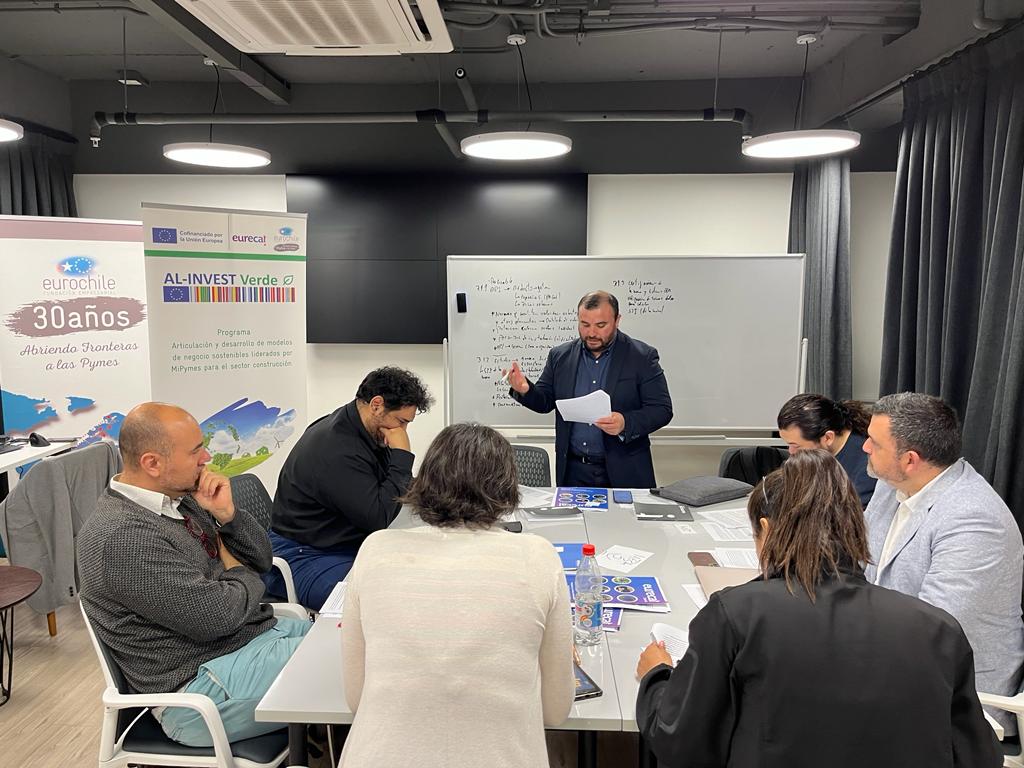Second Eurecat and Eurochile Metropolitan Region Consultative Roundtable: Driving Innovation in the Construction Sector
Last Thursday 23rd November, the Technological Centre of Catalonia, Eurecat, and the Eurochile Business Foundation held the second consultative round table in the framework of the AL-INVEST Verde Construction programme. This session was focused on actors from the Metropolitan Region, with the aim of collaboratively building the action plans of the project for Micro, Small and Medium Enterprises (MSMEs) in the region. The main goal was to address the local gaps and opportunities faced by these enterprises in bringing circular and sustainable products and services to the market.
Several companies and business organisations from the construction sector in the Metropolitan Region, interested in implementing circular systems in their processes related to the construction sector, participated in this initiative. The dynamics of this second consultative table was carried out with the World Café methodology, and consisted of representatives of Eurecat and Eurochile presenting topics related to the project separated into four axes, which allowed participants to have the opportunity to exchange information and discuss these topics
With regard to the above, the first axis, called “Production of sustainable materials and services”, was presented by Jose Espí, Head of Line at Eurecat. This axis focused on the optimisation of materials through the efficient use of non-renewable natural resources, as well as the development and encouragement of the use of secondary raw materials and recycled materials.
In the second axis, “Efficient consumption”, Fabian Vallespin, project executive of Eurochile’s Sustainability and Circular Economy area, addressed the intelligent management of available resources, focusing on waste minimisation to improve environmental performance, as well as on the promotion of renewable energy sources, which represent clean resources capable of supplying energy demand in a more sustainable way.
On the other hand, Cristian Riquelme, Advanced Researcher at Eurecat, developed the third axis, entitled “Secondary raw materials”, presenting various strategies and tools to address current challenges. This included a register of secondary raw materials, providing detailed information on emissions and transfers of pollutants in the construction and demolition process.
Finally, in the fourth axis, “Waste/by-product management”, José Antonio Carrasco, a specialist in business competitiveness, innovation and technology at Eurecat, focused on the responsible management of resources. His approach focused on improving environmental practices related to waste management, promoting the selective dismantling of buildings, boosting the traceability of waste and products, and efficiently managing resources in large-scale projects to favour the environmental recovery of degraded environments.
In this way, Carolina Briones, executive director of the Technological Centre for Innovation in Construction (CTEC), announced that, “we like the focus of this initiative, which has to do with the life cycle of materials and construction works. During the workshop we saw a survey of different policies and initiatives that can be carried out by the public sector, academia, the private sector and we hope in the future to be able to contribute through CTEC“.
On the other hand, Carlos Aguirre, academic and researcher at the school of architecture of the Universidad San Sebastián, stresses that, “this initiative has been particularly useful because it has allowed us to discuss different aspects and to propose a direct future for the circular economy of our construction sector. I think that the opinions that come from the state, academia, companies and international organisations allow us to have a good perspective on how we are going to influence future challenges“.
In this sense, the initiatives being developed by Eurecat and Eurochile in the framework of the project aimed at the construction sector allow industry players to exchange ideas, understand the current context of the sector and establish connections with other companies or business organisations to promote the development of new activities.

